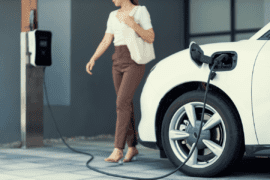If you read the news regularly (or ever, really) you already know that climate change is a serious issue. Technology in all fields has taken an interest in improving our resource consumption while reducing humanity’s carbon footprint in response. The automotive industry has certainly followed, and electric vehicles (EVs) are no exception. Major car companies like Chevrolet, Nissan, and Hyundai as well as motorcycle manufacturers like Harley-Davidson (with their 2020 LiveWire) have shown increased focus in green vehicle production.
So. Your question is: should you buy an electric vehicle? Let’s compare some pros and cons.
Pro: Cheaper to run
The average American spends over $2,000 a year on gasoline. At an average of 12 cents per kilowatt hour for electricity costs, however, a person driving an EV would be paying around $550 a year to charge their vehicle. Let’s just say that you have either car for 10 years: you’d save $14,500 on the cost of running your vehicle alone with an EV. On top of saving $1450 every year in gas, think about never having to go to a gas station again. Maintenance is typically less expensive, as the brakes wear out slower compared to normal vehicles and the engine doesn’t need oil for lubrication.
Con: The initial investment can be expensive
Buying a brand new EV can be pricey compared to a similar gas powered vehicle – but there are lots of incentives associated with buying a new EV. Federal tax credits can be as high as $7,500 for a new vehicle, and that doesn’t include state-based rebates. While the initial monetary figure can be alarming, the overall cost of a brand new EV can end up being less than a gas-powered or hybrid vehicle.
Pro: Used EVs can be cheaper because of the exact reason above
Because of the significant amount of tax credits available for new buyers that aren’t transferable, a used EV can be significantly cheaper than its original MSRP. Also, keep in mind that many EV owners use them for short commutes so their overall mileage tends to be a bit lower than other vehicles of the same year.
Con: Restricted range
Speaking of lower mileage, that can be an issue with EVs: travel range can be restricted. Some EVs have a range of about 200 miles on a full charge which is a bit less than a full tank of gas. Depending on where you live it may be hard to find a charging station as well. If you’re a good planner, however, it’s an easy problem to overcome. If you’re considering an EV for regular commuting, it’s also a relatively easy issue to avoid, and technology is constantly improving with newer EVs having ranges of 300+ miles a charge.
Pro: Technology is improving performance
As EVs are powered by electricity: wheels too. Maximum torque is available off the get-go as opposed to an gas engine that need to get going before reaching higher levels of torque. The overall ride is smoother without thousands of tiny little combustions powering your vehicle. Higher torque from a dead stop means faster acceleration – dispelling the common myth that EVs are inherently slow.
Con: Battery packs need replacing
The most common argument against EVs is that the battery needs replacing. While that’s true – the battery does need to be replaced – many manufacturers are offering an 8 year/100,000 mile warranty. Keep in mind, an electric motor doesn’t need oil to lubricate its engine, so, no oil changes. Ever. Technology (as mentioned above) is improving continuously in this rapidly expanding market which will continue to bring down battery prices in the future.
Pro: Commuter Lane
Many states allow EV vehicles in commuter lanes on the highway, even if they’re only occupied by a single person. Now your commute isn’t only less expensive on the daily, it’s faster.
Con: Electricity can be powered by fossil-fuels
Not every state has a green source for energy production. Some states still rely on fossil fuels to provide electricity to its constituents, so you may still be using fossil fuels to power your vehicle. This may seem counterintuitive to the whole point, but…
Pro: EVs are way, way better for the environment.
Let’s face it, we’ve built one of the biggest global industries around a finite source: oil. Not only do we consume it relentlessly, but its combustion and consequent emission output is terribly bad for our environment. Every small step in harm reduction is a good thing, and a global changeover from combustion engines to EV would be an excellent choice for posterity. The majority of emissions from EVs comes from the manufacturing process itself, which, in the worst cases is on par with the manufacturing of combustion-engine vehicles. So, in the long run: EV is the way to stay green.
So, should you buy an electric vehicle?
That depends on a variety of factors, but it is our belief that the pros outweigh the cons. As far as long-term sustainability goes, technology is only getting better in terms of battery life and charge and as time goes on, the little maintenance required by EVs will also become cheaper. On the same note, more and more charging stations are popping up nationwide to serve an ever growing population of EV drivers.
AutoBidMaster.com has a variety of clean and salvage title electric vehicles up for auction. Start reducing your carbon footprint with us.
- JK Auto Import: An AutoBidMaster and Copart Success Story - January 24, 2024
- 5 Frequently Replaced Car Parts You Can Salvage from Junk Cars - October 16, 2023
- Top Muscle Cars for Your Next Restoration Project - October 9, 2023






